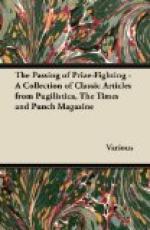* * * * *
Yet more theatrical recollections. The latest volume of them is My Remembrances (CASSELL), in which Mr. EDWARD H. SOTHERN recounts, with the pleasant humour to be expected from him, what he quaintly (and quite unjustifiably) calls “The Melancholy Tale of Me.” One has heard that Mr. SOTHERN, now that he has retired from the stage, proposes to live in England; the book explains such an intention by its evidence of the writer’s intense love for this country. Naturally he has a rich stock of good stories, amongst which I was delighted to welcome yet once again that old favourite about the departing spectator who, on being told that two Acts remained to be performed, said briefly, “That’s why I’m going!” Newer (to me) was the Dundreary tale that told how the elder SOTHERN’S triumph was actually the result of JEFFERSON’S partiality for horse-exercise. The connection I leave you to find out. Like all volumes of its kind, My Remembrances abounds in photographs. At times, indeed, you may be tempted to consider that the domain of the family portrait album has been too largely usurped. But there is even about this a friendliness which, coupled with the brisk style of its writing, will give the book a popularity as wide as that of its author.
* * * * *
We all know that Mr. WILLIAM CAINE has a gay humour, and he indulges it liberally, sometimes rollickingly, in The Fan. With a candour which I warmly commend he states conspicuously that most of these stories have appeared before, and he expresses his acknowledgments to various Editors over a widish range—from Macmillan’s Magazine to London Opinion, and from The English Review to Answers. It would be an innocent diversion to have to guess which story was written for which Editor. But for whatever public the author caters he is, with only one or two exceptions, out for fun, and he gets it. Some of his stories are pure extravaganzas, but they are written in a style unusually good for this kind, and by a very shrewd observer of human foibles. Messrs. METHUEN tell us that Mr. CAINE “views life from an angle all his own,” and although I do not often find myself in agreement with publishers’ opinions of their own wares it is to me a right angle.




